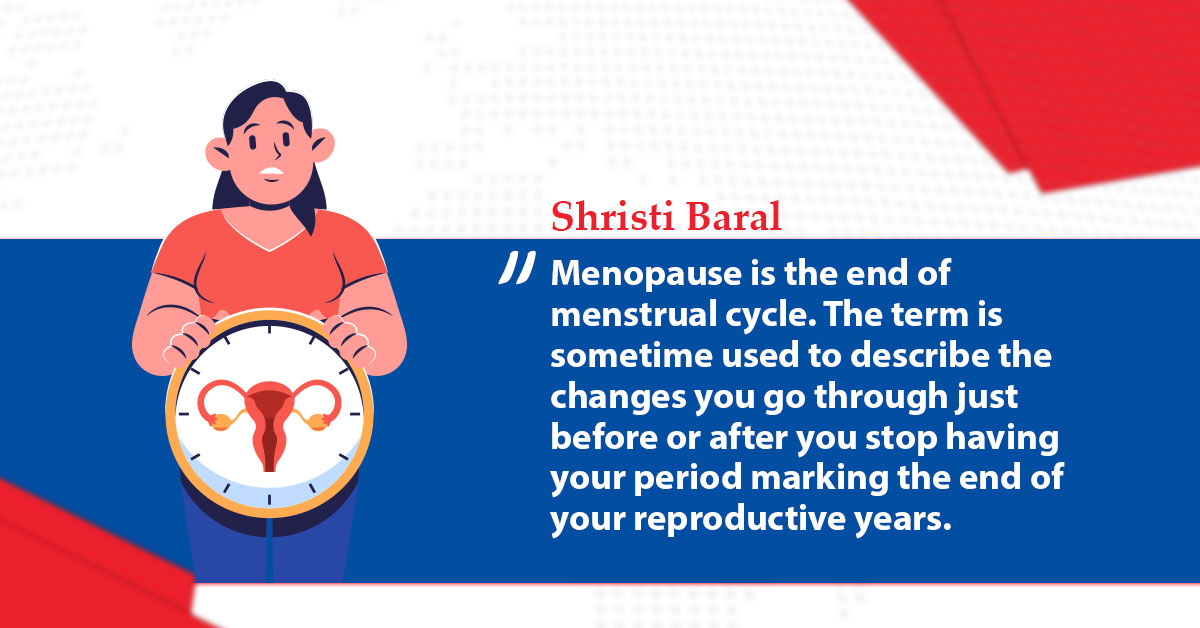

Menopause is the end of menstrual cycle. The term is sometime used to describe the changes you go through just before or after you stop having your period marking the end of your reproductive years. Menopause usually happens around age 50. Menopause is mainly caused by the loss of ovarian follicular function
• Most women experience menopause between the ages of 45 and 55 years as a natural part of biological ageing. The menopausal transition can be gradual, usually beginning with changes in the menstrual cycle.
Stage of menopause
• Primenopause: This is the transitional time that starts before menopause and includes the 12 months that follow a person’s last period.
• Menopause: This start either 12 months after the last period or when menstruation has stopped for a clinical reason such as the removal of the ovaries.
• Postmenopause: Postmenopause refers to the year after menopause although it can be difficult to know when menopause finished and postmenopause starts.
Causes
Menopause is caused by the loss of ovarian follicular function and a decline in circulating blood estrogen levels.
In some cases menopause may start early as a result of:
• Pelvic injury
• Chemotherapy
• Surgery
• Gender affirming hormone therapy
• Radiation therapy
Premature menopause
• an autoimmune disease
• Genetic
• In rare cases an infection such as tuberculosis, malaria
Symptoms
Common physical symptoms include:
• Dry eye
• Hair loss
• Changes in breast size or shape
• Headaches
• Night sweat
• Flushing
• Vaginal dryness
• Hot flashes
• Itching
• Insomnia
• Increased urination
• Palpitation
• Tender breasts
• Weight gain
• Muscle or joint pain
• Pain during penetrative sex
Common mental and emotional symptoms include:
• Depression
• Irritability
• Decreased sexual desire
• Irritability
• Fatigue
• Forgetfulness
First signs of menopause: Early signs of menopause typically include irregular menstruation but you may also start to notice hot flashes, mood changes and other unusual symptoms.
Diagnosis
Menopause is not an illness but many people benefit from seeing their doctors when menstruation ends.
• Ask symptoms, age, duration of menstruation
• Blood test :
-Follicle stimulating hormone (FSH)
– Thyroid hormones
-Estradiol
Blood levels that are consistently 30 ml/mL or higher combined with a lack of menstruation for 1 year can usually confirm menopause.
Lifestyle tips
Tips for managing the challenges of menopause include:
• Eat healthy diet
• Establishing good sleeping habits
• Stay hydrated
• Getting regular exercise
• Quitting smoking
• Doing kegel exercise
• Seeing counseling for anxiety, mood changes and relationship concerns
• Establishing good sleeping habits and getting plenty of rest
Treatment
Menopause is a natural process. Many symptoms will go away over time. But if they’re causing problems, treatments can help you feel better. Depending on your symptoms you might find it helpful to use:
• Vaginal lubricant during masturnation and sex to prevent discomfort
• Vaginal moisturizer to help relieve or prevent everyday drynesss
• Antidepressants and other oral medications therapy to help manage hot flashes
• Topical hormone therapy to help prevent atrophic vaginitis
Prevention of premenopause
• Exercise regularly
• Eat a healthy diet
• Get enough sleep
• Avoid smoking
• Limit alcohol and caffeine
• Reduce stress
• Maintain hygine
Complications
Physical changes during menopause can increase your risk of:
• Urinary tract infections (UTI)
• Heart disease
• Urinary incontinence
• Osteoporosis
• Vaginal infections